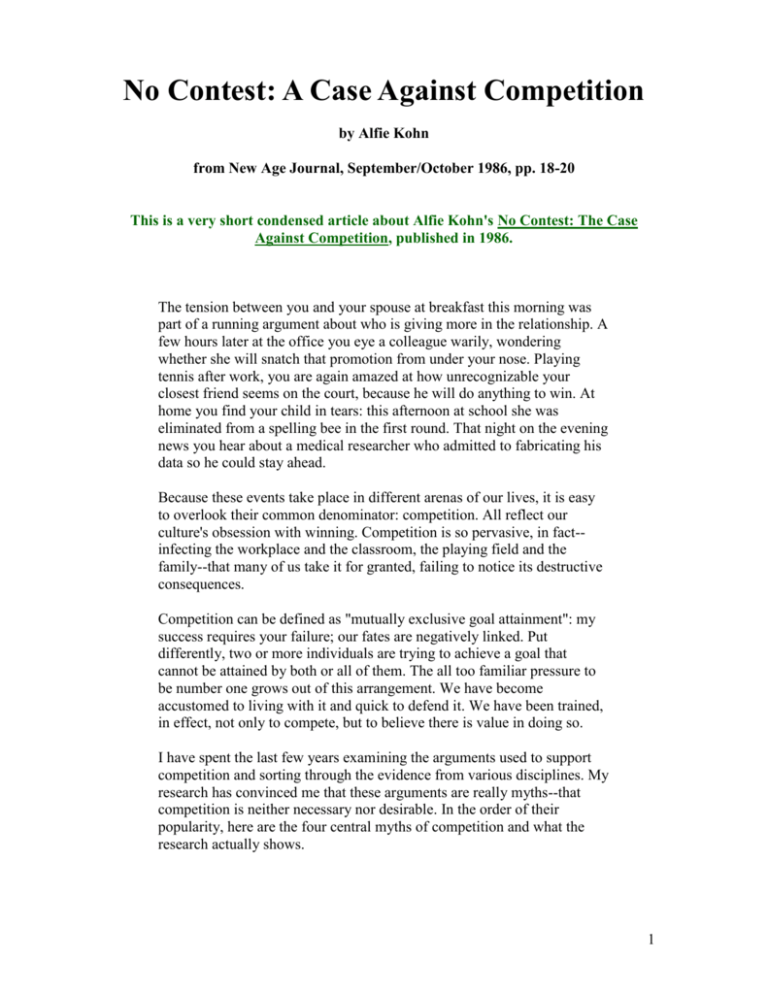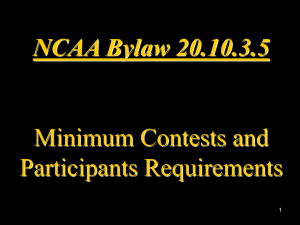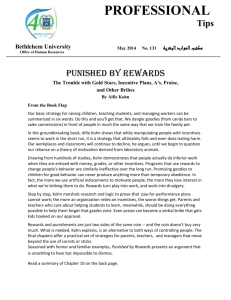No Contest: A Case Against Competition
advertisement

No Contest: A Case Against Competition by Alfie Kohn from New Age Journal, September/October 1986, pp. 18-20 This is a very short condensed article about Alfie Kohn's No Contest: The Case Against Competition, published in 1986. The tension between you and your spouse at breakfast this morning was part of a running argument about who is giving more in the relationship. A few hours later at the office you eye a colleague warily, wondering whether she will snatch that promotion from under your nose. Playing tennis after work, you are again amazed at how unrecognizable your closest friend seems on the court, because he will do anything to win. At home you find your child in tears: this afternoon at school she was eliminated from a spelling bee in the first round. That night on the evening news you hear about a medical researcher who admitted to fabricating his data so he could stay ahead. Because these events take place in different arenas of our lives, it is easy to overlook their common denominator: competition. All reflect our culture's obsession with winning. Competition is so pervasive, in fact-infecting the workplace and the classroom, the playing field and the family--that many of us take it for granted, failing to notice its destructive consequences. Competition can be defined as "mutually exclusive goal attainment": my success requires your failure; our fates are negatively linked. Put differently, two or more individuals are trying to achieve a goal that cannot be attained by both or all of them. The all too familiar pressure to be number one grows out of this arrangement. We have become accustomed to living with it and quick to defend it. We have been trained, in effect, not only to compete, but to believe there is value in doing so. I have spent the last few years examining the arguments used to support competition and sorting through the evidence from various disciplines. My research has convinced me that these arguments are really myths--that competition is neither necessary nor desirable. In the order of their popularity, here are the four central myths of competition and what the research actually shows. 1 Myth 1: Competition Is Inevitable As with a range of other unsavory behaviors, we are fond of casually attributing competition to something called "human nature." Since this account is so popular, you might expect that there is considerable evidence to support it. In fact, it is difficult to find a single serious defense of the claim--let alone any hard data to back it up. It is not difficult at all, however, to come up with reasons to doubt that competition is inevitable. We in the United States often assume that our desperate quest to triumph over others is universal. But half a century ago Margaret Mead and her colleagues found that competition was virtually unknown to the Zuni and Iroquois in North America and to the Bathonga of South Africa. Since then, cross-cultural observers have confirmed that our society is the exception rather than the rule. From the Inuit of Canada to the Tangu of New Guinea, from kihbutzniks in lsrael to farmers in Mexico, cooperation is prized and competition generally avoided. Working with seven to nine-year olds, psychologists Spencer Kagan and Millard Madsen found that Mexican children quickly figured out how to cooperate on an experimental game, while those from the United States could not. In fact, 78 percent of the Anglo-American children took another child’s toy away “for apparently no other reason than to prevent the other child from having it.” Mexican children did so only half as often. Such findings strongly suggest that competition is a matter of social training and culture rather than a built-in feature of our nature. Further evidence comes from classroom experiments in which children have been successfully taught to cooperate. Gerald Sagotsky and his colleagues at Adelphi University, for example, trained 118 pairs of first- through third grade students to work together instead of competing at a variety of tasks. Seven weeks later a new experimenter introduced a new game to these children and found that the lesson had stuck with them. Other researchers have shown that children taught to play cooperative games will continue to do so on their own time. And children and adults alike express a strong preference for the cooperative approach once they see firsthand what it is like to learn or work or play in an environment that doesn't require winners and losers. Myth 2: Competition Keeps Productivity High and is Necessary for Excellence It is widely assumed that competition boosts achievement and brings out the best in us--that without it life would be “a bland experience" and we would become "a waveless sea of nonachievers," as Spiro Agnew once put it. Many people who make such claims, however, confuse success with competition--even though the two concepts are quite different. I can succeed in knitting a scarf or writing a book without ever worrying 2 whether it is better than yours. Or I can work with you--say, to write a report or build a house. Which method is more productive--competition or cooperation? The answer will take many by surprise. David and Roger Johnson, brothers who are educators at the University of Minnesota, recently analyzed 122 studies of classroom achievement conducted from 1924 to 1980. Sixty five found that cooperation promotes higher achievement than competition, eight found the reverse, and thirty-six found no significant difference. One after another, researchers across the country have come to the same conclusion: Children do not learn better when education is transformed into a competitive struggle. In the late 70s Robert Helmreich of the University of Texas at Austin and his colleagues decided to see whether this was also true in the “real world.” They gave personality tests to 103 male scientists and found that those whose work was cited most often by their colleagues (a reasonable measure of achievement) were those who enjoyed challenging tasks but were not personally competitive. To make sure this surprising result wasn't a fluke, Helmreich conducted similar studies on businessmen, academic psychologists, undergraduates, pilots, and airline reservation agents. Each time he found the same thing: a significant negative correlation between competitiveness and achievement. On reflection, these results--and similar findings from scores of other studies in the workplace and the classroom--make perfect sense. First of all, trying to do well and trying to beat others really are two different things. A child sits in class, waving her arm wildly to attract the teacher’s attention. When she is finally called on, she seems befuddled and asks, "Um, what was the question again?” Her mind is on edging out her classmates, not on the subject matter. These two goals often pull in opposite directions. Furthermore. competition is highly stressful: the possibility of failure creates agitation if not outright anxiety, and this interferes with performance. Competition also makes it difficult to share our skills, experiences, and resources--as we can with cooperation. All of this should lead us to ask hard questions not only about how we grade--or degrade--students and organize our offices, but also about the adversarial model on which our legal system is based and, indeed, about an economic system rooted in competition. Myth 3: Recreation Requires Competition It is remarkable, when you stop to think about it, that the American way to have a good time is to play (or watch) highly structured games in which one individual or team must triumph over another. Grim, determined 3 athletes memorize plays and practice to the point of exhaustion in order to beat an opposing team--this is often as close as our culture gets to a spirit of play. Children, too, are pitted against one another as they conduct serious business on Little League fields. Sports psychologist Terry Orlick observed that such activities often leave their mark on young participants. "For many children,” he wrote, “competitive sports operate as a failure factory that not only effectively eliminates the 'bad ones' but also turns off many of the 'good ones'... In North America it is not uncommon to lose from 8O to 90 percent of our registered organized sports participants by fifteen years of age." Research in nonrecreational settings clearly shows that those who are not successful in initial competitions continue to perform poorly and drop out when given the chance. Even the youngest children get the message, as is obvious from the game of musical chairs, an American classic. X number of players scramble for X minus-one chairs when the music stops. Each round eliminates one player and one chair until finally a single triumphant winner emerges. Everyone else has lost and been excluded from play for varying lengths of time. This is our idea of how children should have fun. Reflecting on the game, Orlick came up with an alternative: what if the players instead tried in squeeze onto fewer and fewer chairs until finally a group of giggling kids was crowded on a single chair? Thus is born a new game--one without winners and losers. The larger point is this: All games simply require achieving a goal by overcoming some obstacle. Nowhere is it written that the obstacle must be other people; it can be a time limit or something intrinsic to the task itself--so that no win-lose framework is required. We can even set up playful tasks so everyone works together to achieve a goal--in which case opponents become partners. Myth 4: Competition Builds Character Some people defend striving against others as a way to become “stronger.” Learning how to win and lose is supposed to toughen us and give us confidence. Yet most at us sense intuitively that the consequences of struggling to be number one are generally unhealthy. As the anthropologist Jules Henry put it, “a competitive culture endures by tearing people down." To a large extent, we compete to reassure ourselves that we are capable and basically good. Tragically, though, competing does nothing to strengthen the shaky self-esteem that gave rise to it. The potential for humiliation, for being exposed as inadequate, is present in every competitive encounter. 4 Trying to outperform others is damaging--first of all, because most of us lose most of the time. Even winning doesn't help, because self-esteem is made to depend on the outcome at a contest, whereas psychological health implies an unconditional sense of trust in oneself. Moreover, victory is never permanent. King of the Mountain is more than a child's game; it is the prototype for all competition, since winning promptly establishes one as the target for one's rivals. In any case. the euphoria of victory fades quickly. Both winners and losers find they need more, much like someone who has developed a tolerance to a drug. Two sports psychologists, Bruce Ogilvie and Thomas Tutku, after studying some fifteen thousand athletes, could find no support for the belief that sport builds character. "Indeed, there is evidence that athletic competition limits growth in some areas," they concluded after recording depression, extreme stress, and relatively shallow relationships in competitors. Many players "with immense character strengths” avoid competitive sports, they found. Other research has found that competition leads people to look outside themselves for evidence of their self-worth. Cooperativeness, on the other hand, has been linked to emotional maturity and strong personal identity. Perhaps the most disturbing feature of competition is the way it poisons our personal relationships. In the workplace, you may be friendly with your colleagues, but there is a guardedness, a part of the self held in reserve because you may be rivals tomorrow. Competition disrupts families, making the quest for approval a race and turning love into a kind of trophy. On the playing field it is difficult to maintain positive feelings about someone who is trying to make you lose. And in our schools students are taught to regard each other not as potential collaborators, but rather as opponents, rivals, obstacles to their own success. Small wonder that the hostility inherent in competition often erupts into outright aggression. Ridding ourselves of the ill effects of rivalry is not an easy task. It is not enough to get rid of “excessive competition”--cheating and Vince Lombardi-style fanaticism--because the trouble lies at the very heart of competition itself. Instead of perpetuating an arrangement that allows one person to succeed only at the price of another’s failure, we must choose a radically new vision for our society, one grounded in cooperative work and play. But first we must leave the myths about competition behind us. Then we can work to change the institutions that define us as opponents and devise healthier, more productive alternatives. AlIie Kohn is an independent scholar and writer who lives in Cambridge, MA. This piece is adapted from NO CONTEST: THE CASE AGAINST COMPETITION, which will be published by Houghton Mifflin this month. (NOTE: Book was published in 1986) 5 6







